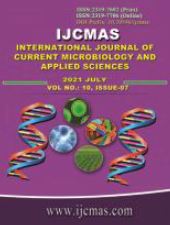


 National Academy of Agricultural Sciences (NAAS)
National Academy of Agricultural Sciences (NAAS)

|
PRINT ISSN : 2319-7692
Online ISSN : 2319-7706 Issues : 12 per year Publisher : Excellent Publishers Email : editorijcmas@gmail.com / submit@ijcmas.com Editor-in-chief: Dr.M.Prakash Index Copernicus ICV 2018: 95.39 NAAS RATING 2020: 5.38 |
Present study was conducted to assess management practices and perceived training needs of livestock farmers in arid region of Rajasthan state India. Interview schedule was used to collect data from one hundred forty randomly selected farmers. Ninety five percent of the respondents kept cow only, 40.71 % kept sheep only, 86.42 % kept goat only while 57% kept cow, goat and sheep combined. Majority (93.57%) of the respondents kept their animals under the loose housing system of management, 9.28 % kept intensive housing and 25 % kept both housing systems. Very few (1.42%) of the farmers interviewed kept farm records. All the respondents had basic knowledge on how a healthy animal should look like. About seventy percent indicated that Ephermal fever, Botulism, repeat breeding, Black quarter and FMD in cattle; Enterotoxaemia, PPR, Sheep pox, diarrhoea in goat and sheep was the most frequently observed health problem in their flocks. A high percentage of the respondents indicated training needs in the area of clean milk production (93.57 %), improvement in animal productivity (87.14%), prevention of animal diseases and health management practices (84.28 %), protection measures during extreme climatic situation (79.28%), genetic improvement and indigenous breed conservation (75.71%), risk reduction through animal insurance (67.85%), livestock Waste management(65 %), ration formulation (63.57.0%), artificial insemination (62.14%), Improvement in Nutritious value of available fodder (52.85%) and commercial livestock farming (42.14%). Great potentials exist for livestock production in the arid region and this can be achieved through sound extension education and need based training programme to the farmers.
 |
 |
 |
 |
 |